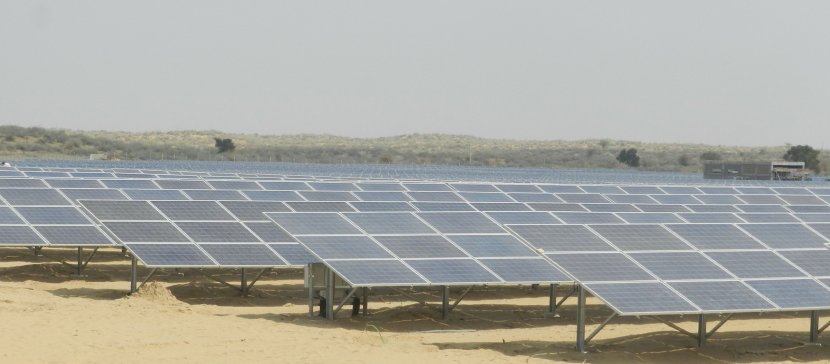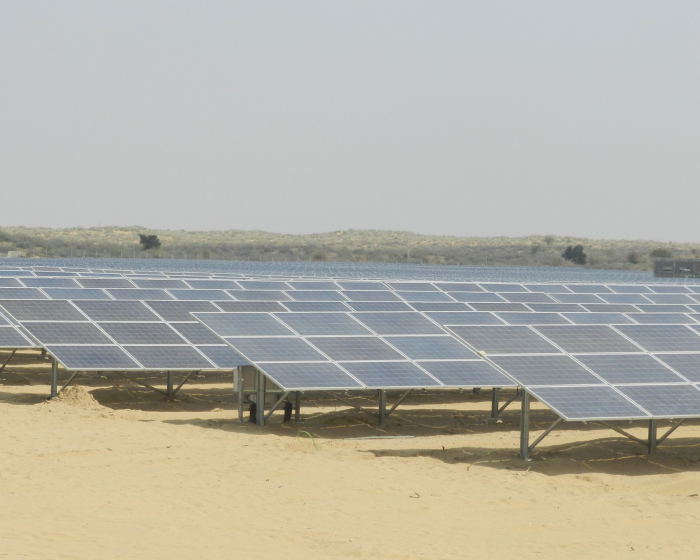Rajasthan has become the first Indian state to achieve over 50% of its total installed power capacity from solar energy, reaching approximately 23 GW of solar installations. By 2022, Rajasthan became the first Indian state to exceed 10 GW of large-scale solar installations.
To encourage further adoption of solar energy, the government offers a solar subsidy in Rajasthan to subsidise residents for installing solar panels on their rooftops. This subsidy reduces the cost of installation, making solar energy more affordable and accessible for everyone.
By taking advantage of this subsidy, you can lower your electricity bills by up to 95% and contribute to a greener environment.
New Solar Policy in Rajasthan
Rajasthan has a new Renewable Energy Policy for 2023. The goal is to have 90 GW of renewable energy by 2030, with 65 GW coming from solar power. This policy supports small to medium-sized solar projects, rooftop solar installations, and off-grid systems.
It also encourages projects that combine wind and solar energy and offers incentives for manufacturing and energy storage systems. The state provides financial help and infrastructure support to create jobs and improve the energy sector.
Additionally, the policy includes special fees for projects that do not sell power to the local electricity companies. This will help make renewable energy more accessible and affordable for everyone.
Objective of Solar Panel Subsidies
The objectives of Solar subsidies in Rajasthan are:
- Boost Solar Energy Adoption
Subsidies aim to make solar panels affordable for households. This encourages the widespread use of renewable energy.
- Reduced Electricity Bills
By installing rooftop solar systems, households can lower their power costs and even earn money by selling surplus energy to the grid.
The subsidies help India achieve its renewable energy targets. This includes reducing carbon emissions and increasing non-fossil fuel power capacity.
- Promote Energy Independence
The program reduces reliance on imported energy and fosters self-reliance in electricity generation.
- Empower Rural and Urban Communities
Financial assistance ensures equitable access to solar benefits across diverse regions and income levels.
Expanding solar infrastructure generates employment and supports India’s green economy.
Benefits of Solar Panel Subsidies in Rajasthan
The benefits of solar subsidy in Rajasthan are:
- Affordable Solar Installation
The subsidy significantly reduces the upfront cost of installing solar panels, making clean energy accessible to homeowners and housing societies.
Solar systems generate renewable energy, reducing reliance on the grid. Many households see up to a 95% reduction in electricity bills and even earn credits through net metering.
The solar subsidy reduces the costs of solar system installation and helps homeowners recover their investments faster. Thus, the payback period becomes shorter.
- Support for Rural Electrification
Subsidies help electrify remote areas, improving energy access across Rajasthan.
Using Indian-made solar panels supports domestic manufacturing and job creation.
Who is Eligible for Solar Panel Subsidy in Rajasthan?
The Rajasthan government solar subsidy is designed to encourage the use of renewable energy.
- The applicant must be a citizen of India.
- The applicant must own a house with a roof that is suitable for solar panel installation.
- The household must have an electricity connection from a MNRE-registered local DISCOM.
- The household should not have previously received any subsidy for solar panels.
Subsidies are available through the National Portal for Rooftop Solar. The online application for solar rooftops in Rajasthan makes the process accessible and streamlined.
Step-by-Step Guide to Avail Solar Panel Subsidy
Here is a simple step-by-step guide to applying for the Rajasthan government solar subsidy:
1. Register Online: Visit the National Portal for Rooftop Solar and register by entering your state, district, electricity provider, and customer account number.
2. Submit Application: Fill out the rooftop solar application form, upload required documents such as ownership proof, vendor invoice, etc., and submit it online.
3. Eligibility: A verification is required to check if your location is ready for solar panel installation.
4. Choose an Empanelled Vendor: Select an installer approved by the Rajasthan Renewable Energy Corporation Limited (RRECL) to ensure subsidy eligibility.
5. Install Solar System: Once approved, install the solar system through a certified vendor.
6. Providing Details: Once the installation process begins you need to provide details for your solar rooftop installations.
7. Apply for Net Metering: After installation, request a net meter and submit plant details on the portal.
8.Inspection and Commissioning: DISCOM will inspect the system and issue a commissioning certificate.
9. Request Subsidy: Once all the above process has been seen through you can put you request for subsidy.
10. Receive Subsidy: Submit bank details and a cancelled cheque on the portal. The subsidy amount will be credited to your account within 30 days.
How Sunsure Energy Can Help?
Like the solar subsidy scheme makes solar installations easier for households, we at Sunsure Energy help businesses to adopt solar in an affordable way.
Sunsure Energy provides clean energy solutions to India’s leading businesses, with a mission to make the country’s corporate decarbonization – efficient and effortless. Sunsure helps companies offset up to 70% of their power consumption through long-term RTC (round the clock power) Power Purchase Agreements (PPAs) across solar, wind, and battery storage – with ease and confidence while reducing costs by up to 50% compared to conventional sources. Some of our top clients among various others are:
Conclusion
Rajasthan’s push for solar energy is backed by incentives like concessional land rates, tax exemptions, and fee waivers, making solar investments attractive. The state’s Renewable Energy Policy 2023 aims to establish 90 GW of renewable energy projects by 2029-30, including 65 GW of solar and 15 GW of wind and hybrid power.
Despite challenges like limited infrastructure for power evacuation, homeowners can benefit from the solar subsidy in Rajasthan to reduce electricity costs while supporting clean energy goals. Continued government support ensures Rajasthan remains a leader in India’s solar revolution.




